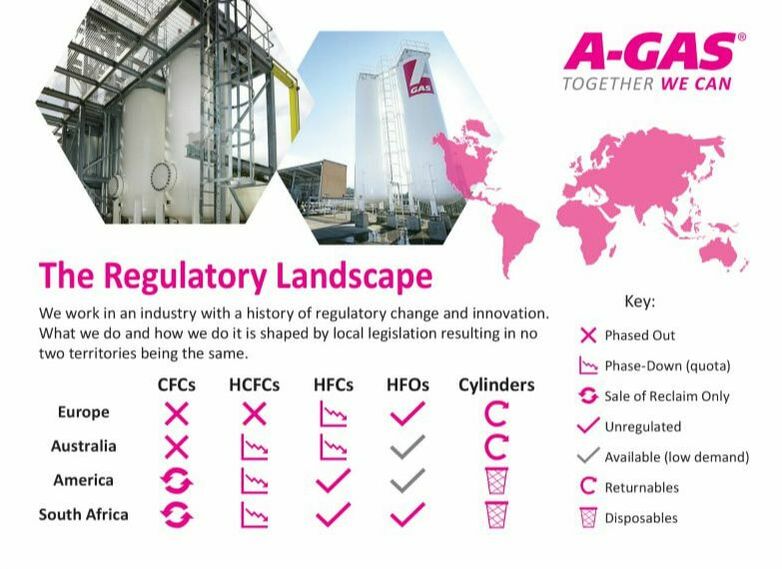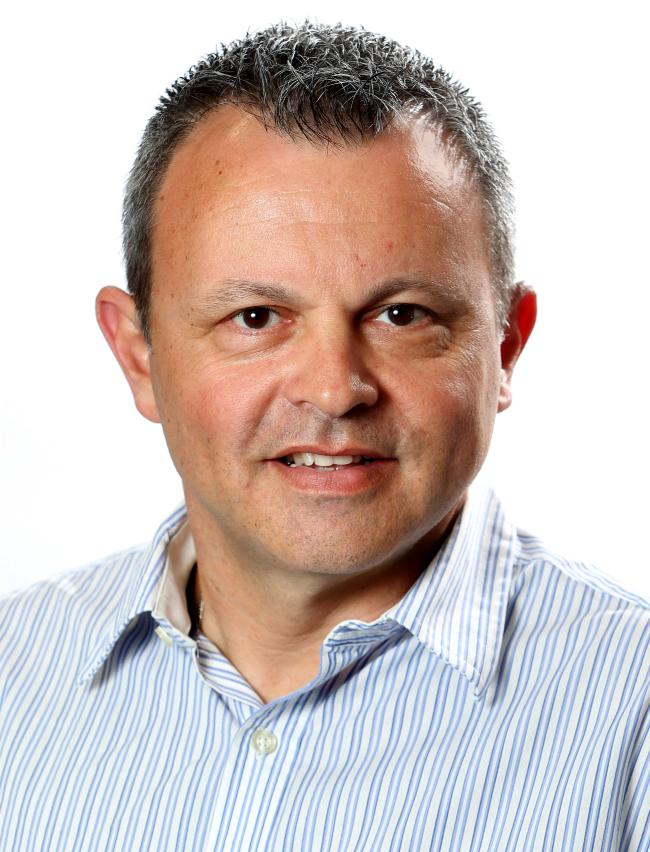17 April 2019
|
|
A-Gas commercial director Enzo D’Alessio explains how refrigeration practices, rules and regulations differ across the world.
Innovation by the UK’s heating, ventilation, air conditioning and refrigeration industry means that we are well placed in the world league table of nations looking to reduce their global warming impact. |
Equipment manufacturers, suppliers and contractors have seized the opportunity to take on board the demands of the F-Gas Regulations and show the rest of the world that change can be managed in a way to benefit everyone. In the coming months we will be saying goodbye to virgin R404A as the UK industry opts for low GWP alternatives and reaps the benefits of using reclaimed gases to reduce its reliance on high GWP refrigerants.
The F-Gas Regulations apply to all EU countries but how successful implementation has and will be often differs between nations and sectors. To a great extent the supermarkets in the UK and in other EU countries have led the way. They have grasped the nettle in the use of new equipment or retrofitted existing packs. The supermarket majors should be praised for getting on with the job of adapting to the F-Gas changes
There is no doubt that reclamation and recovery is growing in importance across the world. The A-Gas Rapid Recovery Service is making an impact in the UK after its launch in 2017.
Faster recovery
Later this year A-Gas Rapid Recovery will extend its service to the Benelux countries and Germany, offering refrigerant recovery many times faster than traditional recovery units. This follows the successful launch of Rapid Recovery in Australia and South Africa, two countries where the rules and regulations around refrigeration products differ again. You only have to look at the use of disposable cylinders in South Africa to recognise they have a long way to go before they are on the same page as the UK.
The Benelux venture will build on the A-Gas purchase of Dutch refrigerant recycler BTC in 2017 and the German automotive expert, AFK, in 2018. The BTC facility in Eygelshoven – close to the German and Belgian borders – is well placed geographically and has been equipped with a new separator to handle reclaimed refrigerants on the continent.
Reclamation and recovery are playing key roles in ensuring that we are making the most of the refrigerants already in use and reducing our reliance on virgin supplies.
In many circumstances the use of reclaim can be a temporary fix for customers who are yet to decide on their low GWP preference.
It’s not gone unnoticed that if you are an EU state bordering a non-EU country in southern Europe you are likely to have issues with illegal imports. Shady products available online in disposable containers can give a clear indication that these gases are not all they claim to be.
My advice is that if you do notice anything online that suggests that the gas is suspicious you should report it to the authorities. Customs in the UK are doing their best to stop illegal supplies and we appear to have tighter controls on our borders, so I believe that we are making progress here. As for Brexit, A-Gas trades both ways with our Continental counterparts and we will be looking for the best business outcomes whatever the end game.
Beyond borders
The view from across the North Atlantic is different as the US has no regulations to drive a GWP phase down. In some parts of the US there is a mood for change but international climate policies are not high on the White House to-do list.
Don’t forget that R448A and R449A low GWP alternatives are American products so the US has the necessary to make the switch if it wants to. With no legislative push to ditch high GWP refrigerants and no HFC quota mechanisms place, as it hasn’t ratified the Kigali Amendment to the Montreal Protocol, there is currently little desire to switch.
The rest of the world would like the US to do so but this is very much a domestic US political issue and one which will have to be resolved on the home front. So currently you will have to look outside the US for the drivers of change.
A-Gas Rapid Recovery has been launched in Canada and we are confident that this will be a success. Canada differs from its US neighbour as it has signed up to the Kigali Amendment. It has a refillable cylinder market and has the same attitude to reducing the use of high GWP products as the UK.
Earlier this year A-Gas bought the Singapore-based refrigerant company VEMAC Services. The business is a market leader in recovery, reclamation and sales of refrigerants in Singapore and neighbouring countries. The regulation timelines may be different but Singapore is progressive in managing refrigerants and there is a huge amount of air conditioning equipment being replaced or upgraded to more efficient products or low GWP gases. This is driving good growth and we believe this is prime A-Gas territory.
At A-Gas we are used to working beyond borders to do business. We believe that the key to prospering in these markets is having the flexibility to adapt to their differences – and having the right products and services that can cross continents.
www.agas.com
The F-Gas Regulations apply to all EU countries but how successful implementation has and will be often differs between nations and sectors. To a great extent the supermarkets in the UK and in other EU countries have led the way. They have grasped the nettle in the use of new equipment or retrofitted existing packs. The supermarket majors should be praised for getting on with the job of adapting to the F-Gas changes
There is no doubt that reclamation and recovery is growing in importance across the world. The A-Gas Rapid Recovery Service is making an impact in the UK after its launch in 2017.
Faster recovery
Later this year A-Gas Rapid Recovery will extend its service to the Benelux countries and Germany, offering refrigerant recovery many times faster than traditional recovery units. This follows the successful launch of Rapid Recovery in Australia and South Africa, two countries where the rules and regulations around refrigeration products differ again. You only have to look at the use of disposable cylinders in South Africa to recognise they have a long way to go before they are on the same page as the UK.
The Benelux venture will build on the A-Gas purchase of Dutch refrigerant recycler BTC in 2017 and the German automotive expert, AFK, in 2018. The BTC facility in Eygelshoven – close to the German and Belgian borders – is well placed geographically and has been equipped with a new separator to handle reclaimed refrigerants on the continent.
Reclamation and recovery are playing key roles in ensuring that we are making the most of the refrigerants already in use and reducing our reliance on virgin supplies.
In many circumstances the use of reclaim can be a temporary fix for customers who are yet to decide on their low GWP preference.
It’s not gone unnoticed that if you are an EU state bordering a non-EU country in southern Europe you are likely to have issues with illegal imports. Shady products available online in disposable containers can give a clear indication that these gases are not all they claim to be.
My advice is that if you do notice anything online that suggests that the gas is suspicious you should report it to the authorities. Customs in the UK are doing their best to stop illegal supplies and we appear to have tighter controls on our borders, so I believe that we are making progress here. As for Brexit, A-Gas trades both ways with our Continental counterparts and we will be looking for the best business outcomes whatever the end game.
Beyond borders
The view from across the North Atlantic is different as the US has no regulations to drive a GWP phase down. In some parts of the US there is a mood for change but international climate policies are not high on the White House to-do list.
Don’t forget that R448A and R449A low GWP alternatives are American products so the US has the necessary to make the switch if it wants to. With no legislative push to ditch high GWP refrigerants and no HFC quota mechanisms place, as it hasn’t ratified the Kigali Amendment to the Montreal Protocol, there is currently little desire to switch.
The rest of the world would like the US to do so but this is very much a domestic US political issue and one which will have to be resolved on the home front. So currently you will have to look outside the US for the drivers of change.
A-Gas Rapid Recovery has been launched in Canada and we are confident that this will be a success. Canada differs from its US neighbour as it has signed up to the Kigali Amendment. It has a refillable cylinder market and has the same attitude to reducing the use of high GWP products as the UK.
Earlier this year A-Gas bought the Singapore-based refrigerant company VEMAC Services. The business is a market leader in recovery, reclamation and sales of refrigerants in Singapore and neighbouring countries. The regulation timelines may be different but Singapore is progressive in managing refrigerants and there is a huge amount of air conditioning equipment being replaced or upgraded to more efficient products or low GWP gases. This is driving good growth and we believe this is prime A-Gas territory.
At A-Gas we are used to working beyond borders to do business. We believe that the key to prospering in these markets is having the flexibility to adapt to their differences – and having the right products and services that can cross continents.
www.agas.com
Content continues after advertisements









